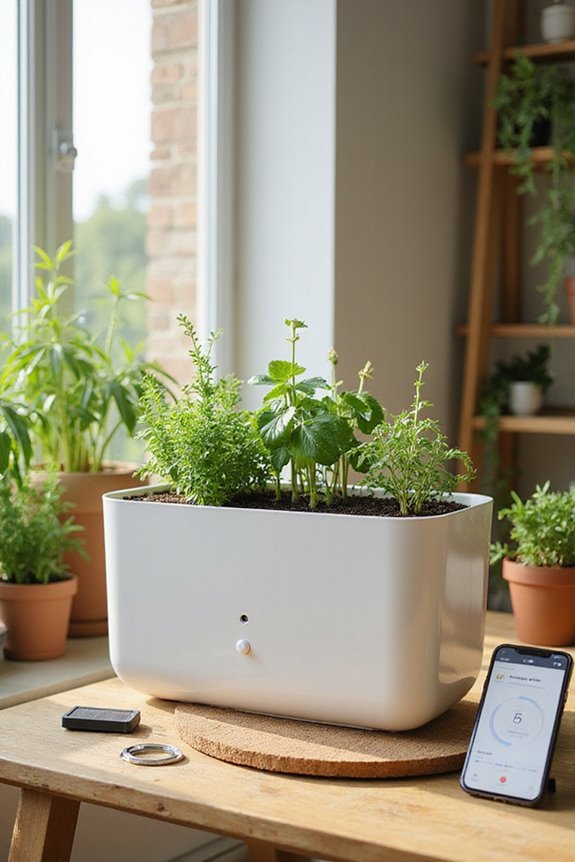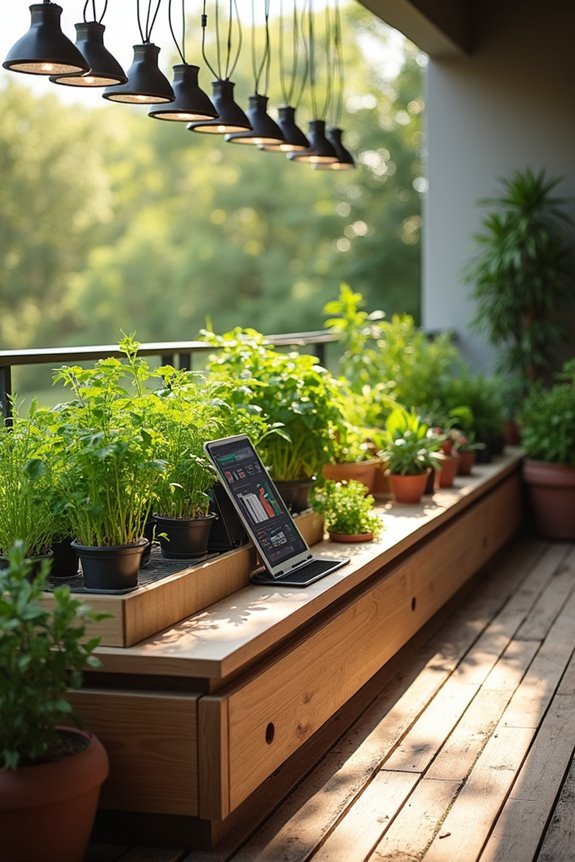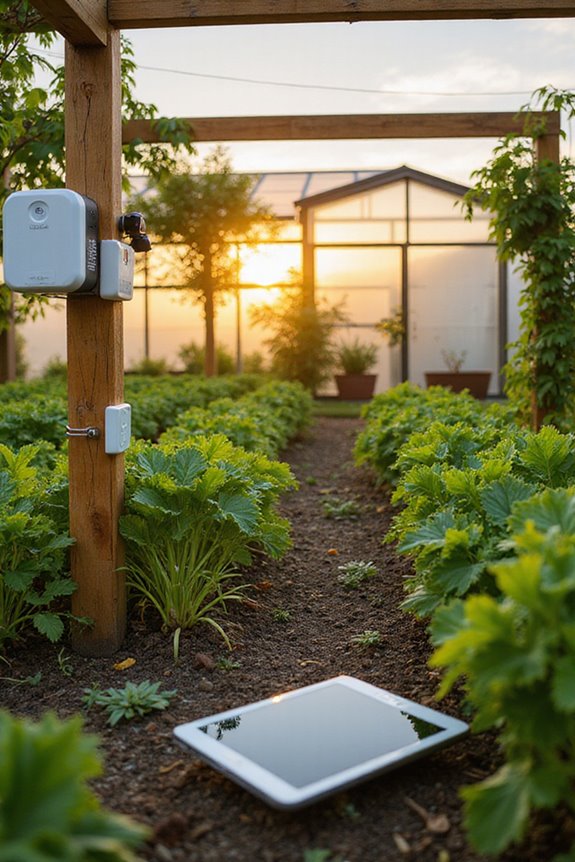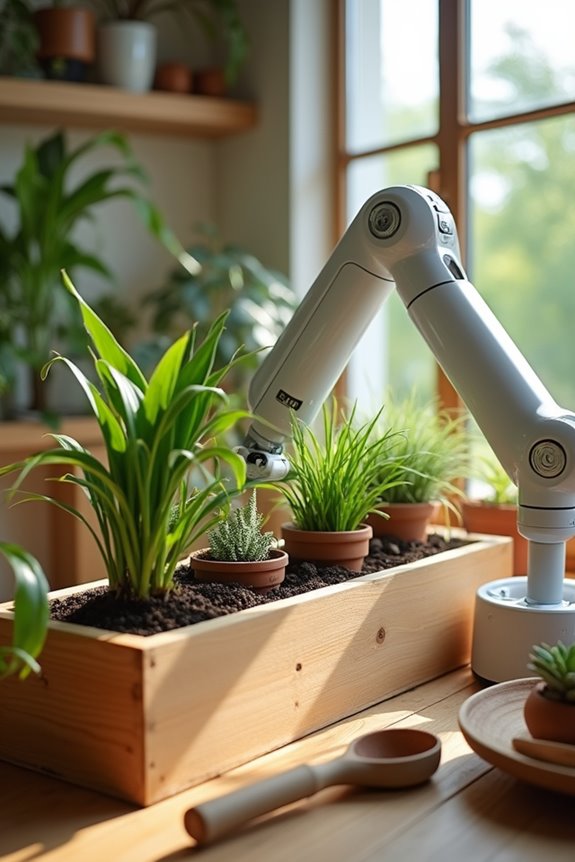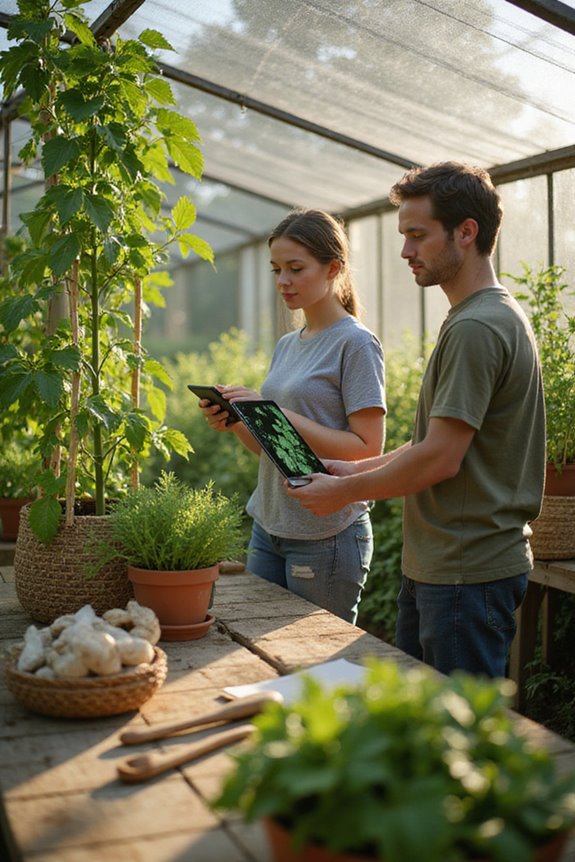Innovative plant care technologies are transforming how we cultivate plants. Here are some key advancements:
- AI-Supported Growth Control: This helps us monitor plant health and predict yield.
- Smart Irrigation Systems: They conserve water by adjusting based on soil moisture.
- Fogponics: This method uses a mist to deliver nutrients without soil, saving water.
These technologies enhance efficiency and sustainability in agriculture. If you’re curious, we’ll explore each of these innovations in detail.
Key Takeaways
- AI-supported growth control uses data analytics for informed decision-making and precise plant care, improving crop quality and yield predictability.
- Next-generation smart lighting systems optimize light spectra for different growth stages, enhancing energy efficiency and plant quality.
- Smart irrigation systems utilize soil moisture sensors and weather data to conserve water and optimize watering schedules, reducing waste significantly.
- Fogponics technology delivers nutrients through a fine mist, conserving water while maximizing oxygen availability and nutrient concentration.
- Robotics and automation streamline plant care processes, enhancing efficiency, reducing labor costs, and improving overall sustainability in farming practices.
AI-Supported Growth Control
As we explore AI-supported growth control, it’s clear that this technology is transforming how we manage crops. Through AI monitoring, we can collect continuous data on plant health and growth stages. This reduces the need for manual crop checks, allowing us to make informed decisions.
Predictive analytics plays a crucial role, analyzing data to improve crop quality and yield predictability. For instance, AI helps us identify the best planting times and crop types based on climate and soil conditions. It also enables real-time adjustments to irrigation and nutrient delivery, ensuring plants receive exactly what they need.
Next-Generation Smart Lighting Systems

Next-generation smart lighting systems are revolutionizing plant care in exciting ways. These systems optimize spectral output, providing the right wavelengths for different growth stages. For instance, blue light supports vegetative growth, while red light encourages flowering. This spectral optimization improves plant quality and growth outcomes.
Additionally, smart lighting enhances energy efficiency. Automated systems can cut energy consumption by up to 40%, which helps lower utility bills. With LED grow lights lasting over 25,000 hours, we also reduce replacement costs.
Moreover, the automation of lighting guarantees consistent light output, minimizing human error. This reliability supports year-round production. Together, these innovative technologies make plant care easier and more sustainable, allowing us to focus on nurturing our plants.
Smart Irrigation Systems
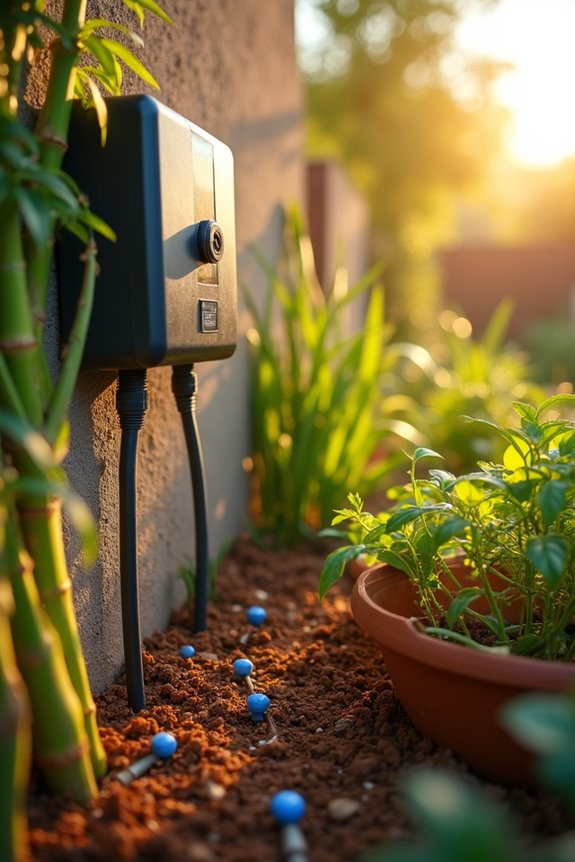
Smart irrigation systems represent a significant advancement in plant care technology. These systems use soil moisture sensors to measure how wet the ground is and adjust watering accordingly. For instance, weather-based controllers utilize real-time data to optimize irrigation schedules, guaranteeing plants get just the right amount of water.
- Water Conservation
- Traditional irrigation can waste up to 50% of water.
- Smart systems enhance efficiency by tailoring schedules to actual plant needs.
- Wireless connectivity allows easy monitoring via smartphones.
- Alerts for leaks help prevent water loss.
- Evapotranspiration metrics calculate water needs based on weather forecasting.
- This guarantees plants thrive while conserving precious resources.
Fogponics Technology and Smart Indoor Gardens
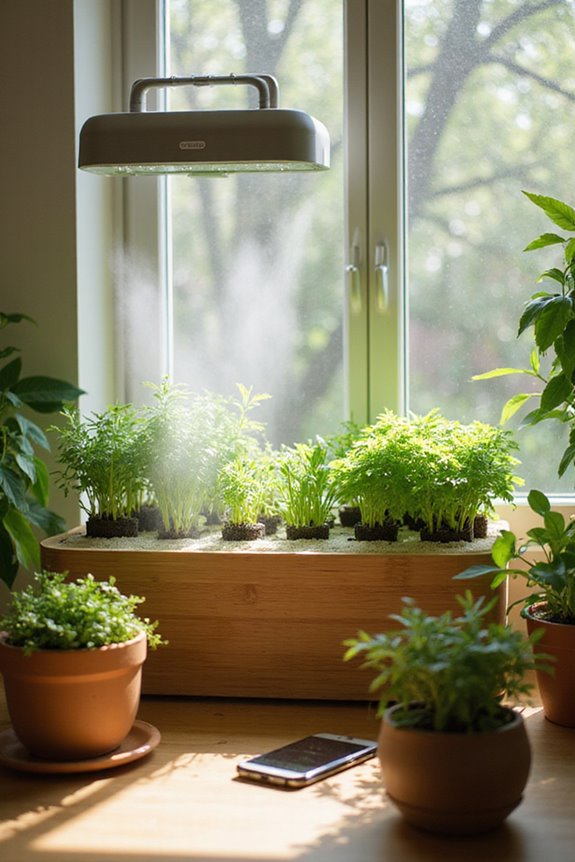
In recent years, fogponics technology has gained attention for its innovative approach to growing plants without soil. This method uses a fine mist to deliver nutrients directly to the roots, enhancing fogponics efficiency. By suspending roots in air, it maximizes oxygen availability and allows for ideal nutrient delivery.
Key benefits include:
- Water Conservation: Uses 30-50% less water than hydroponics and 98% less than traditional soil methods.
- Nutrient Absorption: Maintains high nutrient concentration, reducing waste compared to other systems.
- Smart Indoor Gardens: Integrates AI for monitoring and adjustments, creating a controlled environment perfect for diverse plants.
Integration of Robotics and Automation in Plant Care
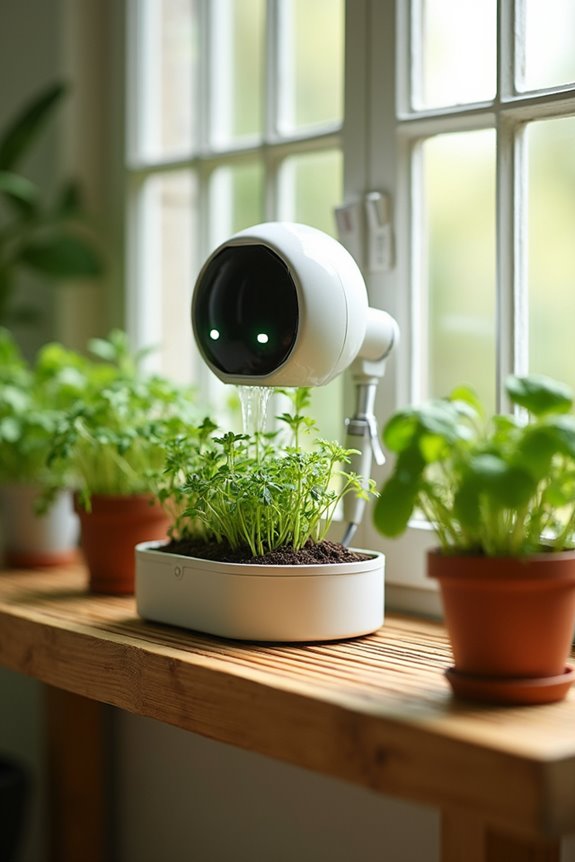
As we explore the integration of robotics and automation in plant care, it’s clear that these technologies are transforming how we manage crops. Robotic transplanting systems guarantee gentle transfers from nurseries to growing racks, enhancing plant health. This automation streamlines workflow, allowing for more crop cycles and higher yields.
Autonomous monitoring plays an essential role in maintaining plant health. Robots like ARIS continuously check for signs of stress, pests, or diseases. This leads to timely interventions and reduced reliance on manual inspections.
Moreover, automation in tasks like leaf-pruning boosts efficiency and light penetration, further optimizing growth. Together, robotic and automated solutions not only reduce labor costs but also enhance the overall sustainability of our farming practices.
Frequently Asked Questions
How Do I Choose the Right Technology for My Plant Care Needs?
When choosing the right technology for our plant care needs, we should conduct thorough plant care assessments and guarantee technology compatibility. Together, we can find solutions that nurture our green companions while fitting our lifestyles.
Can These Technologies Be Used in Outdoor Gardening?
Did you know smart irrigation can reduce water use by up to 50%? We can enhance our outdoor gardens with soil sensors that monitor health, making gardening more efficient, enjoyable, and sustainable for our shared green spaces.
What Is the Average Cost of Implementing These Systems?
When we consider cost comparison for implementing these systems, budget planning is essential. Prices vary widely depending on features and technology, but we can find options that fit our needs and financial comfort.
Are There Any Maintenance Requirements for These Innovative Technologies?
Like a well-tended garden, our innovative technologies need regular maintenance. We must guarantee technology compatibility and schedule maintenance frequency to keep everything thriving, so let’s nurture our tools just as we do our plants.
How Can I Troubleshoot Common Issues With Smart Plant Care Systems?
When troubleshooting smart plant care systems, we should check sensor calibration and address any connectivity issues. Together, we can guarantee our plants thrive by maintaining accurate readings and reliable connections throughout our gardening journey.

